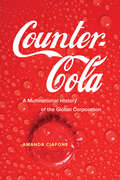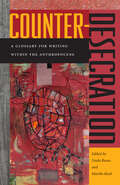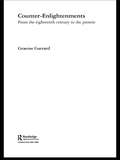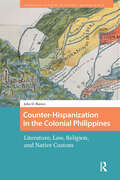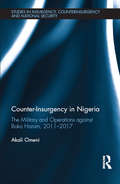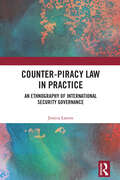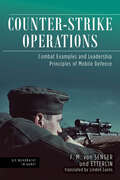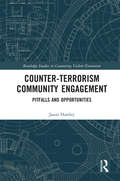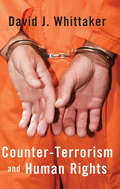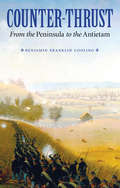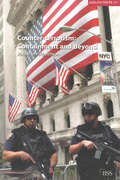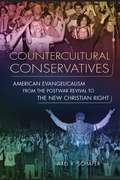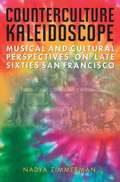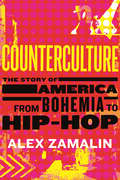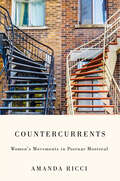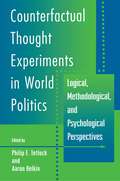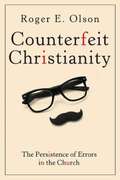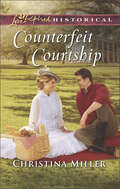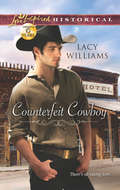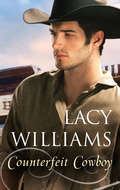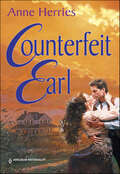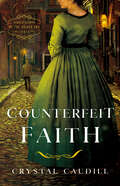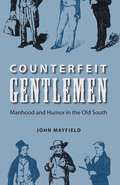- Table View
- List View
Counter-Archive: Film, the Everyday, and Albert Kahn's Archives de la Planète (Film and Culture Series)
by Paula AmadTucked away in a garden on the edge of Paris is a multimedia archive like no other: Albert Kahn's Archives de la Planète (1908-1931). Kahn's vast photo-cinematographic experiment preserved world memory through the privileged lens of everyday life, and Counter-Archive situates this project in its biographic, intellectual, and cinematic contexts. Tracing the archive's key influences, such as the philosopher Henri Bergson, the geographer Jean Brunhes, and the biologist Jean Comandon, Paula Amad maps an alternative landscape of French cultural modernity in which vitalist philosophy cross-pollinated with early film theory, documentary film with the avant-garde, cinematic models of temporality with the early Annales school of history, and film's appropriation of the planet with human geography and colonial ideology. At the heart of the book is an insightful meditation upon the transformed concept of the archive in the age of cinema and an innovative argument about film's counter-archival challenge to history. The first comprehensive study of Kahn's films, Counter-Archive also offers a vital historical perspective on debates involving archives, media, and memory.
Counter-Cola: A Multinational History of the Global Corporation
by Amanda CiafoneCounter-Cola charts the history of one of the world’s most influential and widely known corporations, The Coca-Cola Company. Over the past 130 years, the corporation has sought to make its products, brands, and business central to daily life in over 200 countries. Amanda Ciafone uses this example of global capitalism to reveal the pursuit of corporate power within the key economic transformations—liberal, developmentalist, neoliberal—of the twentieth and twenty-first centuries. Coca-Cola's success has not gone uncontested. People throughout the world have redeployed the corporation, its commodities, and brand images to challenge the injustices of daily life under capitalism. As Ciafone shows, assertions of national economic interests, critiques of cultural homogenization, fights for workers’ rights, movements for environmental justice, and debates over public health have obliged the corporation to justify itself in terms of the common good, demonstrating capitalism’s imperative to either assimilate critiques or reveal its limits.
Counter-Desecration: A Glossary for Writing Within the Anthropocene
by Linda Russo and Marthe ReedNew vocabulary for a world on the brink The Anthropocene is a term proposed for the present geological epoch (from the time of the Industrial Revolution onwards) to highlight the role of humanity in the transformation of earth's environment globally, has become the subject of scholarship not only in the sciences, but also in the arts and humanities as well. Ecopoetics, a multidisciplinary approach that includes thinking and writing on poetics, science, and theory as well as emphasizing innovative approaches common to conceptual poetry, rose out of the late 20th-century awareness of ecology and concerns of environmental disaster. Collected from contributors including Brenda Hillman, Eileen Tabios, and Christopher Cokinos, and together a monument to human responsiveness and invention, Counter-Desecration is a book of ecopoetics that compiles terms—borrowed, invented, recast—that help configure or elaborate human engagement with place. There are no analogous volumes in the field of ecocriticism and ecopoetics. The individual entries, each a sketch or a notion, through some ecopoetic lens—anti-colonialism, bioregionalism, ecological (im)balance, indigeneity, resource extraction, extinction, habitat loss, environmental justice, queerness, attentiveness, sustainability—focus and configure the emerging relations and effects of the Anthropocene. Each entry is a work of art concerned with contemporary poetics and environmental justice backed with sound observation and scholarship.
Counter-Enlightenments: From the Eighteenth Century to the Present (Routledge Studies in Social and Political Thought)
by Graeme GarrardThe Enlightenment and its legacy are still actively debated, with the Enlightenment acting as a key organizing concept in philosophy, social theory and the history of ideas. Counter-Enlightenments is the first full-length study to deal with the history and development of counter-enlightenment thought from its inception in the eighteenth century right through to the present. Engaging in a critical dialogue with Isaiah Berlin’s work, this book analyzes the concept of counter-enlightenment and some of the most important issues and problems it raises. Graeme Garrard explores the diverse forms of thought in this field, with a wide-ranging review of the principle figures of the past two hundred and fifty years, and an incisive assessment of the persuasiveness of the most common and important criticisms of the Enlightenment.
Counter-Hispanization in the Colonial Philippines: Literature, Law, Religion, and Native Custom (Connected Histories in the Early Modern World)
by John BlancoIn Counter-Hispanization in the Colonial Philippines, the author analyzes the literature and politics of “spiritual conquest” in order to demonstrate how it reflected the contribution of religious ministers to a protracted period of social anomie throughout the mission provinces between the 16th-18th centuries. By tracking the prose of spiritual conquest with the history of the mission in official documents, religious correspondence, and public controversies, the author shows how, contrary to the general consensus in Philippine historiography, the literature and pastoral politics of spiritual conquest reinforced the frontier character of the religious provinces outside Manila in the Americas as well as the Philippines, by supplanting the (absence of) law in the name of supplementing or completing it. This frontier character accounts for the modern reinvention of native custom as well as the birth of literature and theater in the Tagalog vernacular.
Counter-Insurgency in Nigeria: The Military and Operations against Boko Haram, 2011-2017 (Studies in Insurgency, Counterinsurgency and National Security)
by Akali OmeniThis book offers a detailed examination of the counter-insurgency operations undertaken by the Nigerian military against Boko Haram between 2011 and 2017. Based on extensive fieldwork conducted with military units in Nigeria, Counter-Insurgency in Nigeria has two main aims. First, it seeks to provide an understanding of the Nigerian military’s internal role – a role that today, as a result of internal threats, pivots towards counter-insurgency. The book illustrates how organizational culture, historical experience, institutions, and doctrine, are critical to understanding the Nigerian military and its attitudes and actions against the threat of civil disobedience, today and in the past. The second aim of the book is to examine the Nigerian military campaign against Boko Haram insurgents – specifically, plans and operations between June 2011 and April 2017. Within this second theme, emphasis is placed on the idea of battlefield innovation and the reorganization within the Nigerian military since 2013, as the Nigerian Army and Air Force recalibrated themselves for COIN warfare. A certain mystique has surrounded the technicalities of COIN operations by the Army against Boko Haram, and this book aims to disperse that veil of secrecy. Furthermore, the work’s analysis of the air force’s role in counter-insurgency is unprecedented within the literature on military warfare in Nigeria. This book will be of great interest to students of military studies, counter-insurgency, counter-terrorism, African politics and security studies in general.
Counter-Piracy Law in Practice: An Ethnography of International Security Governance
by Jessica LarsenThis book is a socio-legal study of counter-piracy. It takes as its case the law enforcement efforts after 2008 to suppress piracy off the coast of Somalia. Through ethnographic fieldwork, the book invites the reader onto a Danish warship patrolling the western Indian Ocean for piracy incidents and into the courtroom in Seychelles, where more than 150 suspects were prosecuted. The aim is to understand how counter-piracy worked in practice. The book uses assemblage theory to approach law as a social process and places emphasis on studying empirical enforcement practices over analysing legal provisions. This supplements existing scholarship on the legal aspects of counter-piracy. Scholarship has mainly examined applicable law governing counter-piracy. This book steps into the field to examine applied law. Its methodology renders visible areas of legal ambiguity and identifies practices that suggest impunity and question legal certainty. It thus contributes with new policy-relevant knowledge for international security governance. The relevance is one of urgency. Counter-piracy off Somalia has served as a governance paradigm, which is replicated in other maritime domains. Consideration of the implications for policy is therefore needed. The book will be of interest to policy-makers, security practitioners and scholars who share a methodological commitment to practice.
Counter-Strike Operations: Combat Examples and Leadership Principles of Mobile Defence (Die Wehrmacht im Kampf)
by F. M. von Senger und EtterlinDetailed analysis of WWII operations undertaken by Germany’s armed forces on the Eastern Front, with illustrative case studies, maps, and diagrams. This volume in the Die Wehrmacht im Kampf series offers detailed analysis of a number of operations on the Eastern Front during World War II to draw out universally applicable principles of counter-strike operations and “agile defense.” The combat examples discussed including delaying operations in Southern Ukraine in March 1944; defensive operations Nikopol and Moldau; and counter-strikes undertaken by panzer divisions and panzerkampfgruppen in operations in November 1943 and May 1944. Combat examples are fully described with maps and diagrams, followed by detailed lessons learned and an explanation of consequences of the operation. The author, F.M. von Senger und Etterlin, himself took part in all of the combat operations described as a young officer leading armored troops. He would later go on to hold the rank of four-star general in the Bundeswehr and his final assignment was CINCENT.
Counter-Terrorism Community Engagement: Pitfalls and Opportunities (Routledge Studies in Countering Violent Extremism)
by Jason HartleyThis book offers insights into the building of trust in Muslim communities through community engagement in a climate of counter-terrorism. Police engagement with Muslim communities is complex with a history of distrust. This book first attempts to understand the role and implications of uncertainty on community engagement in Muslim communities, and then explores the cultural nuances associated with the demonstration of trustworthiness, and decisions to bestow trust. It further highlights the complexities and implications for Muslim leaders when trying to simultaneously engage police and appease their own communities; the book exposes community perceptions of an over-reaction by authorities that has moved suspicion from a handful of terrorists to the entire Muslim community, resulting in problematic community perceptions that Muslim communities are being targeted by police. The findings suggest that the intentionality of police is a highly significant consideration in trust negotiations, and reveals a number of cultural preferences considered critical to trust negotiations. The book further highlights opportunities to enhance the development of trust and avoid pitfalls that can be problematic to community engagement. The lessons learned seek to enhance the existing body of literature regarding strategies and resources to improve counter-terrorism community engagement with Muslim communities. This book will be of much interest to students of counter-terrorism, preventing violent extremism, deradicalization, and security studies.
Counter-Terrorism and Human Rights
by David J. WhittakerThe ever-present threat of terrorism and the growing human-rights backlash against anti-terrorist policies are becoming ever more significant on the international stage. Constant media-coverage and public concern have characterised the debate over the last ten years.This book is a fair and objective assessment of counter-terrorist policy and human rights worldwide, and covers a wide breadth of international material. While raising key questions for reader consideration, this book aims for straight-forward consideration, leaving polemic to the reader.
Counter-Thrust: From the Peninsula to the Antietam (Great Campaigns of the Civil War)
by Benjamin Franklin CoolingDuring the summer of 1862, a Confederate resurgence threatened to turn the tide of the Civil War. When the Union&’s earlier multitheater thrust into the South proved to be a strategic overreach, the Confederacy saw its chance to reverse the loss of the Upper South through counteroffensives from the Chesapeake to the Mississippi. Benjamin Franklin Cooling tells this story in Counter-Thrust, recounting in harrowing detail Robert E. Lee&’s flouting of his antagonist George B. McClellan&’s drive to capture the Confederate capital at Richmond and describing the Confederate hero&’s long-dreamt-of offensive to reclaim central and northern Virginia before crossing the Potomac. Counter-Thrust also provides a window into the Union&’s internal conflict at building a successful military leadership team during this defining period. Cooling shows us Lincoln&’s administration in disarray, with relations between the president and field commander McClellan strained to the breaking point. He also shows how the fortunes of war shifted abruptly in the Union&’s favor, climaxing at Antietam with the bloodiest single day in American history—and in Lincoln&’s decision to announce a preliminary Emancipation Proclamation. Here in all its gritty detail and considerable depth is a critical moment in the unfolding of the Civil War and of American history.
Counter-cartographies: Neurodivergence and the Errancies of Performance
by Leon J. HiltonHow to remake the world with neurodivergence at its heart What if we embraced neurodivergent ways of being not as deviations to be corrected but as vital ways of inhabiting the world? What new realities might emerge? Bringing a much-needed humanistic perspective to the study of autism and other forms of neurodivergence, Counter-cartographies offers a bold reimagining of neurological difference, moving beyond rigid diagnostic frameworks to uncover more expansive, generative modes of existence. Engaging the work of Fernand Deligny to trace how modern taxonomies of neurodivergence have hardened over time, Leon J. Hilton questions how these categories might instead serve as tools for remapping the world with neurodivergence at its center. At the heart of Counter-cartographies is an exploration of performance and performativity that reveals how the norm of neurotypical reality is continually reinforced through acts of doing, redoing, and undoing. Charting the historical shift away from &“mind&” and toward &“brain&” and moving fluidly across disciplines—from digital art and documentary cinema to cybernetics and radical mental health movements—Hilton illuminates the deep interconnections between performance, perception, and the historical construction of the &“neurotypical.&” Through close readings of works by William Pope.L, Mel Baggs, Wu Tsang, and others, Hilton also examines how neurodivergence has been represented, embodied, and materialized in contemporary art and media. Restless, engrossing, and persistently attuned to moments of rupture when the neurotypical order falters, Counter-cartographies charts a path toward a more capacious, imaginative world. Retail e-book files for this title are screen-reader friendly with images accompanied by short alt text and/or extended descriptions.
Counter-terrorism: Containment and Beyond (Adelphi series)
by Jonathan StevensonThe 9/11 attacks revealed that the transnational terrorist threat facing the US and its partners was far more dangerous than most had previously discerned. It was now clear that al-Qaeda intended to, and could threaten the West’s – particularly the US’ – political and military leverage, with the aim of shifting the balance of power from the West to Islam after a violent global confrontation. In that sense, the new terrorist threat is strategic, and it has led to a worldwide mobilisation comparable to that required by a world war. This Paper argues that prevailing in the ‘war’ on terror, much like victory in the Cold War, entails containment, deterrence, outperformance and engagement. Military power is secondary to intelligence, law enforcement, enlightened social policy and diplomacy. Diplomatic engagement with the larger Muslim world is paramount as a means of denying al-Qaeda not merely recruits but the‘clash of civilisations’ it seeks. The US-led intervention in Iraq, though intended to introduce democratic reform in the wider Middle East, has so far antagonised Islam and strengthened Islamist terrorism. This suggests that coercive or aggressively ideological diplomacy is unlikely to win over an Islamic population biased by anti-Western propaganda. Successful Western diplomacy will have to be discreet, nuanced and incremental.
Countercultural Conservatives
by Axel R. SchäferIn the mid-twentieth century, far more evangelicals supported such “liberal” causes as peace, social justice, and environmental protection. Only gradually did the conservative evangelical faction win dominance, allying with the Republican Party of Ronald Reagan and, eventually, George W. Bush. In Countercultural Conservatives Axel Schäfer traces the evolution of a diffuse and pluralistic movement into the political force of the New Christian Right. In forging its complex theological and political identity, evangelicalism did not simply reject the ideas of 1960s counterculture, Schäfer argues. For all their strict Biblicism and uncompromising morality, evangelicals absorbed and extended key aspects of the countercultural worldview. Carefully examining evangelicalism’s internal dynamics, fissures, and coalitions, this book offers an intriguing reinterpretation of the most important development in American religion and politics since World War II.
Counterculture Kaleidoscope
by Nadya ZimmermanForty years after the fact, 1960s counterculture---personified by hippies, protest, and the Summer of Love---basks in a nostalgic glow in the popular imagination as a turning point in modern American history and the end of the age of innocence. Yet, while the era has come to be synonymous with rebellion and opposition, its truth is much more complex. In a bold reconsideration of the late sixties San Francisco counterculture movement, Counterculture Kaleidoscope takes a close look at the cultural and musical practices of that era. Addressing the conventional wisdom that the movement was grounded in rebellion and opposition, the book exposes two myths: first, that the counterculture was an organized social and political movement of progressives with a shared agenda who opposed the mainstream (dubbed "hippies"); and second, that the counterculture was an innocent entity hijacked by commercialism and transformed over time into a vehicle of so-called "hip consumerism." Seeking an alternative to the now common narrative, Nadya Zimmerman examines primary source material including music, artwork, popular literature, personal narratives, and firsthand historical accounts. She reveals that the San Francisco counterculture wasn't interested in commitments to causes and made no association with divisive issues---that it embraced everything in general and nothing in particular.
Counterculture: The Story of America from Bohemia to Hip-Hop
by Alex ZamalinA political and intellectual history of American counterculture and the historical figures who redefined mainstream understandings of freedom, culture, art, and politics—from The Beat Generation to BasquiatThis entertaining, intellectual history fulfills the growing appetite for marginalized narratives. Counterculture brilliantly interrogates the diversity of counterculture and the interwoven relationship between each individual legacy. From Anarchism to the Harlem Renaissance, Alex Zamalin unveils the humanity behind these romanticized figures and popularized movements to capture revolutionary freedom in action.American counterculture, defined as a movement whose values are outside and oppositional to mainstream norms and whose practices fundamentally reject what is socially respectable, ultimately transformed the 20th century.With key players:Emma GoldmanBillie HolidayAllen GinsbergAmiri BarakaJean-Michel BasquiatAnd key movements:AnarchismBlack BohemiaThe Harlem RenaissanceThe Beat GenerationThe Black Arts MovementHip-HopCounterculture reaches new depths, tackling a wide range of historical, social, and political topics, and expanding contemporary understandings of American cultural tradition.At a time when counterculture was on the outskirts of American society, Alex Zamalin explores the reason why.
Countercurrents: Women's Movements in Postwar Montreal (Studies on the History of Quebec/Études d'histoire du Québec #42)
by Amanda RicciIn the decades following the Second World War, women from all walks of life became increasingly frustrated by the world around them. Drawing on long-standing political traditions, these women bound together to revolutionize social norms and contest gender inequality. In Montreal, women activists inspired by Red Power, Black Power, and Quebec liberation, among other social movements, mounted a multifront campaign against social injustice. Countercurrents looks beyond the defining waves metaphor to write a new history of feminism that incorporates parallel social movements into the overarching narrative of the women’s movement. Case studies compare and reflect on the histories of the Quebec Native Women’s Association, the Congress of Black Women, the Front de libération des femmes du Québec, various Haitian women’s organizations, and the Collectif des femmes immigrantes du Québec and the political work they did. Bringing to light previously overlooked archival and oral sources, Amanda Ricci introduces a new cast of characters to the history of feminism in Quebec. The book presents a unique portrait of the resurgence of feminist activism, demonstrating its deep roots in Indigenous and Black communities, its transnational scope, and its wide-ranging inspirations and preoccupations. Advancing cross‐cultural perspectives on women’s movements, Countercurrents looks to the history of women’s activism in Montreal and finds new ways of defining feminist priorities and imagining feminist futures.
Counterfactual Thought Experiments in World Politics: Logical, Methodological, and Psychological Perspectives
by Philip E. Tetlock Aaron BelkinPolitical scientists often ask themselves what might have been if history had unfolded differently: if Stalin had been ousted as General Party Secretary or if the United States had not dropped the bomb on Japan. Although scholars sometimes scoff at applying hypothetical reasoning to world politics, the contributors to this volume--including James Fearon, Richard Lebow, Margaret Levi, Bruce Russett, and Barry Weingast--find such counterfactual conjectures not only useful, but necessary for drawing causal inferences from historical data. Given the importance of counterfactuals, it is perhaps surprising that we lack standards for evaluating them. To fill this gap, Philip Tetlock and Aaron Belkin propose a set of criteria for distinguishing plausible from implausible counterfactual conjectures across a wide range of applications. The contributors to this volume make use of these and other criteria to evaluate counterfactuals that emerge in diverse methodological contexts including comparative case studies, game theory, and statistical analysis. Taken together, these essays go a long way toward establishing a more nuanced and rigorous framework for assessing counterfactual arguments about world politics in particular and about the social sciences more broadly.
Counterfeit Christianity: The Persistence of Errors in the Church (Counterfeit Christianity)
by Roger E. OlsonHistoric heresies didn’t die or fade away. Each generation boasts its own. Even while these counterfeit teachings remain outside the accepted bounds of Christianity, modern-day versions plague churches.So how does a church leader or pastor understand and deal with these age-old controversies when they pop up in the congregation?In this book, Roger Olson describes the curses but also gifts that heresies bring the Church. While heresies can occasionally correct a version of orthodoxy, they are not simple confusions or misunderstandings about impenetrable mysteries of divine revelation. Instead they undermine the faith and are dangerous distortions. The author describes major heresies and how the church dealt with them, the players, and what pastors can do to address these faith issues in order to educate congregations about Jesus, God, and salvation.Also included are questions for individual or group study.Also available - a Leader guide with DVD in which Adam Hamilton hosts on-screen conversations with Roger Olson (9781501806360)
Counterfeit Courtship
by Christina MillerSecond Chance Reunion Returning home, Confederate hero Colonel Graham Talbot faces his toughest battle yet-avoiding the marriage-minded young ladies in town vying for his attentions. With a stepmother and orphaned niece to support, the penniless soldier has no intention of marrying. Neither does the woman he once loved, his next-door neighbor Ellie Anderson. But Ellie has a proposal of her own: a pretend courtship to keep their unwanted admirers at bay. Ellie's unpredictable childhood left her determined to safeguard her independence-and her plantation. Blaming herself for driving Graham away to war, she devises a plan to help them both. But when it goes awry, Ellie will face a choice: save her beloved property...or trust in a relationship that's becoming undeniably real.
Counterfeit Cowboy
by Lacy WilliamsFrom the moment Jesse Baker collides with Erin O'Grady on a Boston train platform, he faces a dilemma. For once, Jesse doesn't want to lie about who and what he is. Yet if she learns he's a con artist, not a cowboy-and the urchin with him is certainly not his brother-she'll never give him a chance.Erin suspects there's more to the enigmatic cowboy than meets the eye. But the sheltered socialite is certain his deep compassion is real. On the long Christmastime train ride to Wyoming, hearts and courage are tested and true motives revealed. And the journey that began in a charade may end with redemption-and a very real love.
Counterfeit Cowboy
by Lacy WilliamsA classic tale from USA Today bestselling author Lacy Williams From the moment Jesse Baker collides with Erin O'Grady on a Boston train platform, he faces a dilemma. For once, Jesse doesn't want to lie about who and what he is. Yet if she learns he's a con artist, not a cowboy--and the urchin with him is certainly not his brother--she'll never give him a chance. Erin suspects there's more to the enigmatic cowboy than meets the eye. But the sheltered socialite is certain his deep compassion is real. On the long Christmastime train ride to Wyoming, hearts and courage are tested and true motives revealed. And the journey that began in a charade may end with redemption--and a very real love.Originally published in 2012
Counterfeit Earl
by Anne HerriesA young woman disappears. A husband is suspected of murder. Stirring times for all the neighborhood.Olivia Roade Burton has lived in obscurity in Steepwood since she brought disgrace on herself by jilting a man of high degree. Now she's grown restless and yearns for excitement. But will any man risk proposing to her? Scarred and disillusioned after his experiences in the Peninsular War, Captain Jack Denning believed he was too tainted to marry a decent girl. Caught in an innocent but compromising situation with Olivia, he's forced into an offer of marriage-one that Olivia accepts with no hesitation. Can she find true love and ease the secret sorrow that haunts Jack's eyes...?Regency DramaIntrigue, mischief...and marriageThe Steepwood Scandal
Counterfeit Faith (Hidden Hearts of the Gilded Age #3)
by Crystal Caudill"Page-turning action combines with depth and richness to create a full-bodied, rewarding read."--Jocelyn Green, Christy Award–winning author of The Metropolitan AffairAs matron of Final Chance House of Refuge, Gwendolyn Ellison has dedicated her life to serving the children deemed delinquents by society. She'll protect them with everything she has. So when she suspects someone is using Final Chance for criminal deeds, she's determined to investigate and put a stop to it. But villains don't like to be crossed--and they're willing to kill to get their way.Gwendolyn knows she can't quit fighting. More than her own life is on the line if counterfeiters go free. She must find someone she can trust to help her expose the criminals and protect the children under her care.Charming and chivalrous Secret Service operative Josiah Isaacs has never been able to turn his back on a woman in trouble--and capturing counterfeiters is his job, after all. The danger he's truly worried about is his growing attraction to Gwendolyn when his heart wants to remain faithful to his deceased wife. As both peril and interest grow, he begins to consider whether a second love may be possible--if they can live through this case. At the same time, he's put off by her faith in a God he no longer trusts. How can a future together even be possible when their beliefs are at odds?"Readers who love romance, suspense, and a graceful amount of faith won't want to miss this story."--Toni Shiloh, Christy Award–winning author"With a host of sympathetic and likable characters (and a few not so likable), a riveting plot that clips along at the perfect pace, and a relatable faith thread, this book [is a] completely enjoyable read."--Kimberly Duffy, Carol Award finalist and author of A Tapestry of Light
Counterfeit Gentlemen: Manhood and Humor in the Old South (New Perspectives on the History of the South)
by John MayfieldWhat does it mean to be a man in the pre–Civil War South? And how can we answer the question from the perspective of the early twenty-first century? John Mayfield does so by revealing how early nineteenth-century Southern humorists addressed the anxieties felt by men seeking to chart a new path between the old honor culture and the new market culture. Lacking the constraints imposed by journalism or proper literature, these writers created fictional worlds where manhood and identity could be tested and explored.

